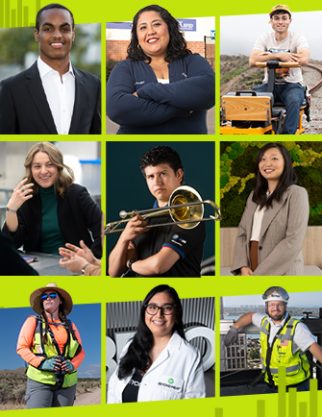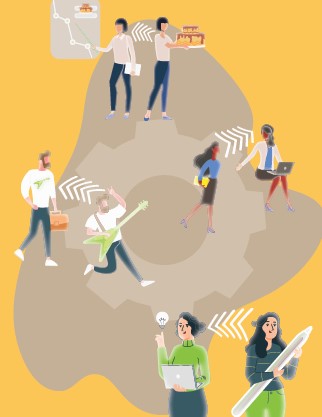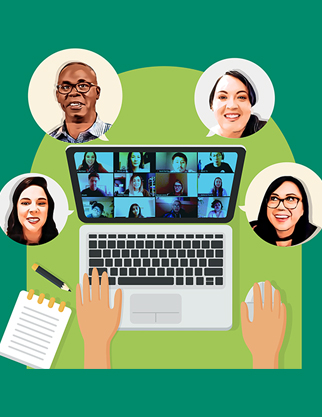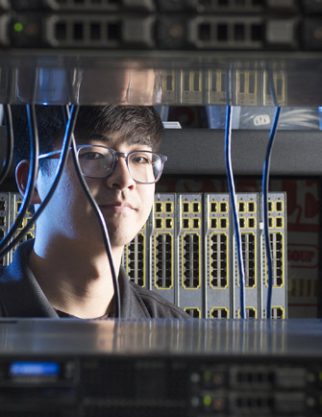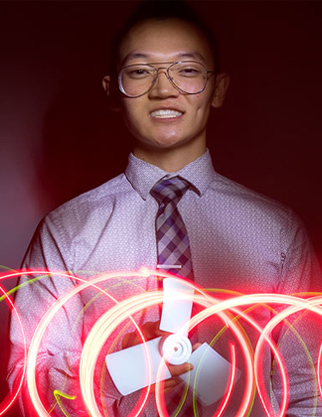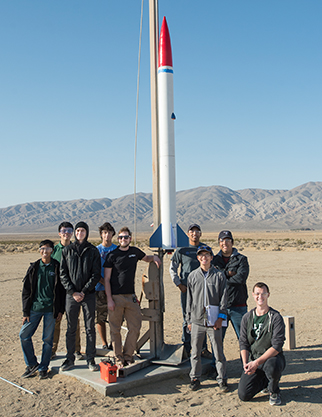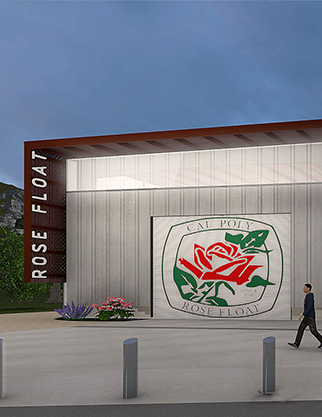Earlier this year, the Career Center held its annual Spring Career Fair, welcoming more than 200 employers to campus from a wide range of industries.
Students crowded the University Quad for the March 5 event, résumés in hand, eager to discuss career opportunities and internship applications. Contact info was exchanged. Connections were established. It was suggested that hands not be shaken.
Then the world changed.
As the coronavirus pandemic worsened, governments responded by issuing shelter-in-place orders and requiring the closure of non-essential businesses, which combined with other factors, led to record high unemployment rates, a rapidly changing work landscape and a growing sense of unease for job seekers.
According to Alexis Tai, career specialist at the Career Center and liaison to the College of Engineering, employers have responded by shifting traditional recruitment methods to the virtual world. Many universities now host online career fairs, job boards and virtual information sessions. Student employment opportunities have similarly shifted to online work. Handshake, the online portal used by the Career Center, reported a 111 percent increase in remote jobs and internship opportunities and has developed a list of companies that are still actively hiring college students.
Some organizations are making the best of the situation by creatively engaging job seekers.
“We have one company, Skanska, that has offered to do virtual site visits to allow students to digitally walk through a construction site with an engineer. Other companies are offering virtual open houses at their locations with top executives sharing more about the company,” Tai says.
At Kiewit, an employee-owned construction and engineering organization and top recruiter of CPP graduates, the pandemic has required talent seekers to attend virtual career fairs and implement a virtual interview process.
“Interestingly, we think this challenging environment has actually allowed us to reach and engage students in more places and in deeper ways than ever before,” says Amy Brown, talent acquisition specialist at Kiewit.
“This may be a bit ‘glass half-full,’ but we think this environment has really helped us refine our recruitment methods.”
As these methods for seeking and securing employment change, the Career Center has made strides of their own to assist students, alumni and employers transition to the changed environment.
“Some of the biggest questions we are hearing right now are, ‘What resources are available to me? What can I do if I’m graduating, if I’ve been laid off, or want to recruit CPP talent?’” Tai says. “Our website now has a wealth of resources we are continually working on to make it easier to find with a simple click.”
The Career Center has been strategic to address industry-specific needs and help companies market their virtual information sessions to students. This spring, for example, The Collins College of Hospitality Management hosted an alumni speaker series to speak specifically on the challenges and opportunities being faced by the hospitality industry and the importance of tapping into networking, and the College of Education and Integrative Studies held a forum with a panel of education professionals to discuss the pandemic’s impact on P-12 education and to provide strategies for searching for jobs during the COVID 19 crisis.
The center is also hosting weekly virtual events on a number of topics, including specific career paths, internships searches, résumé essentials, personal branding, LinkedIn and more. Alumni and students can access these resources through the Handshake portal. (Alumni should email career@cpp.edu to request access at no cost to the events and portal.)
Additionally, more effort has been placed on video tutorials and strategies curated by career specialists, including how to manage a LinkedIn page, tips on remote networking and practicing tough interview questions. There’s also helpful advice on what to do after experiencing a layoff or how to build a skill set while staying at home, for instance.
“Now is the time to intentionally identify job roles of interest. See if there are any skills you can learn online that will make you more competitive for those positions, and then work on acquiring those skills,” Tai says.
These workshops and tutorials can be found on both the website and YouTube channel.
For recent graduates and alumni actively job seeking in the virtual environment, one new concern may be about preparing for the all-important virtual interview process. Handshake reports a 2,500 percent increase in virtual interviews, which means interviewees should take a few additional factors into consideration.
“The first steps would be to get familiar with the software, ensuring tech capabilities are working and that your lighting, sound, professional attire and background are fitting,” Tai says.
Perhaps most important is your camera placement.
“You should be eye level, with the camera an arms-length away,” Tai adds, “and your torso and head should be visible.”
Unsurprisingly, networking remains a crucial component to job seeking. LinkedIn reports that 80 percent of jobs are found through a network, proving that relationships are key. There are several ways to continue networking remotely, which are captured in Tai’s video below:
Despite the doom and gloom about the job market, Cal Poly Pomona’s Career Center remains optimistic, as employers continue to seek out CPP talent and the number of job postings hasn’t slowed, a reflection of the value of a polytechnic education.
At the end of May, months into the health crisis, Handshake had 7,629 job postings and 6,717 were full time. Additionally, more than 1,000 internships and over 300 fellowships remained active. A variety of industries are reflected in these job listings, including K-12 education, internet and software, health care, research and human resources.
“Cal Poly Pomona students continue to impress — they are great academically. They are involved in extracurricular activities, so they’re well-rounded and can manage their time really well,” Brown says.
“They’re also natural leaders and many bring strong internship experience. We [Kiewit] continue to recruit top talent from CPP through our virtual events.”
Virtual information sessions are being added almost daily, so students and alumni should routinely check the website and follow the Career Center on Instagram to stay connected. Specialists are also available by email at careercounseling@cpp.edu and through appointments made on Handshake.
Amidst the rapid changes and uncertainty COVID-19 has brought, at least one thing has remained the same — the commitment of Cal Poly Pomona students.
“Absolutely my favorite aspect of being a career specialist is having the opportunity to work with CPP students and alumni who exhibit incredible resilience, grit, humility and gratefulness,” says Tai, who previously served as a graduate intern at the center from 2017 to 2018.
“It is truly a joy to work with them to help them make strategic career choices and connect them with top opportunities.”
